Social & Behavior Change Communication in Indian Higher Education
Communication plays vital role in bringing and developing desired change in the behaviour of individuals, groups, and communities. Long-term habits and behaviour change affects the way individuals behaves in society. There are positives as well as undesirable behaviour of individuals in all societies across the globe.
Procrastination, quitting smoking, limiting alcohol consumption, healthy eating, doing regular exercise, safe sexual behaviour, and driving carefully etc. are some of the examples of behaviours exhibited by individuals in day-to-day life.
Researches relating to health-related habits has found that even a tiny adjustment can have a big impact on people’s health and life expectancy. In addition to it, even these small changes in habits and behaviour change may lead to enormous improvements in people’s health and life expectancy. These changes can have knock-on effects on the health of others, as well.
A few behavioural adjustments, like avoiding procrastination, regular physical exercise, greater assertiveness at job, early bedtime and engaging in mindfulness activities may contribute to greater wellbeing. So, individuals, communities, and our environment can all benefit from changing fewer desirable habits.

Social & Behavior Change Communication in Indian Higher Education
But, changing the behaviour of the individuals after a certain age becomes challenging. For, instance, today, the punishment for most crimes, such as running red lights, spitting in public, and driving while intoxicated, nearly always consists of monetary fines. However, people less hesitate behaving unwantedly in society.

Thus, considering all the aspects of behaviour change in Indian youth, Lady Irwin College of University of Delhi, and unicef India organised a workshop on ‘Communication for Social and Behaviour Change’ (CSBC) during first week of November 2022.
Faculty members of more than twenty higher educational institutions from around nine states of India participated in this workshop that intended for policy level interventions in Indian higher education system through inculcating nine learning modules relating the communication for social and behaviour change as developed by the unicef.
It is being felt that in order to address the cognitive, social, and structural drivers of positive behaviour, social and behaviour change in Indians, is another method to great significance. Putting the proper balance of community and individual involvement, assistance with local action, changes to policies, and the provision of services and goods together may bring desirable behaviour change in individuals, groups, and communities at large.
Sociologists, cognitive scientists, media and communication experts, anthropologists, marketing professionals, and community development practitioners are among the many disciplines and specialities that may be drivers for social and behaviour change.
Communication for social and behaviour change has been an academic teaching, learning and research activity at higher educational institutions across countries such as United States, Canada, Spain, Mexico, Colombia, the Philippines, Thailand, South Africa, Bangladesh, the United Kingdom, Sweden, Denmark, and others.
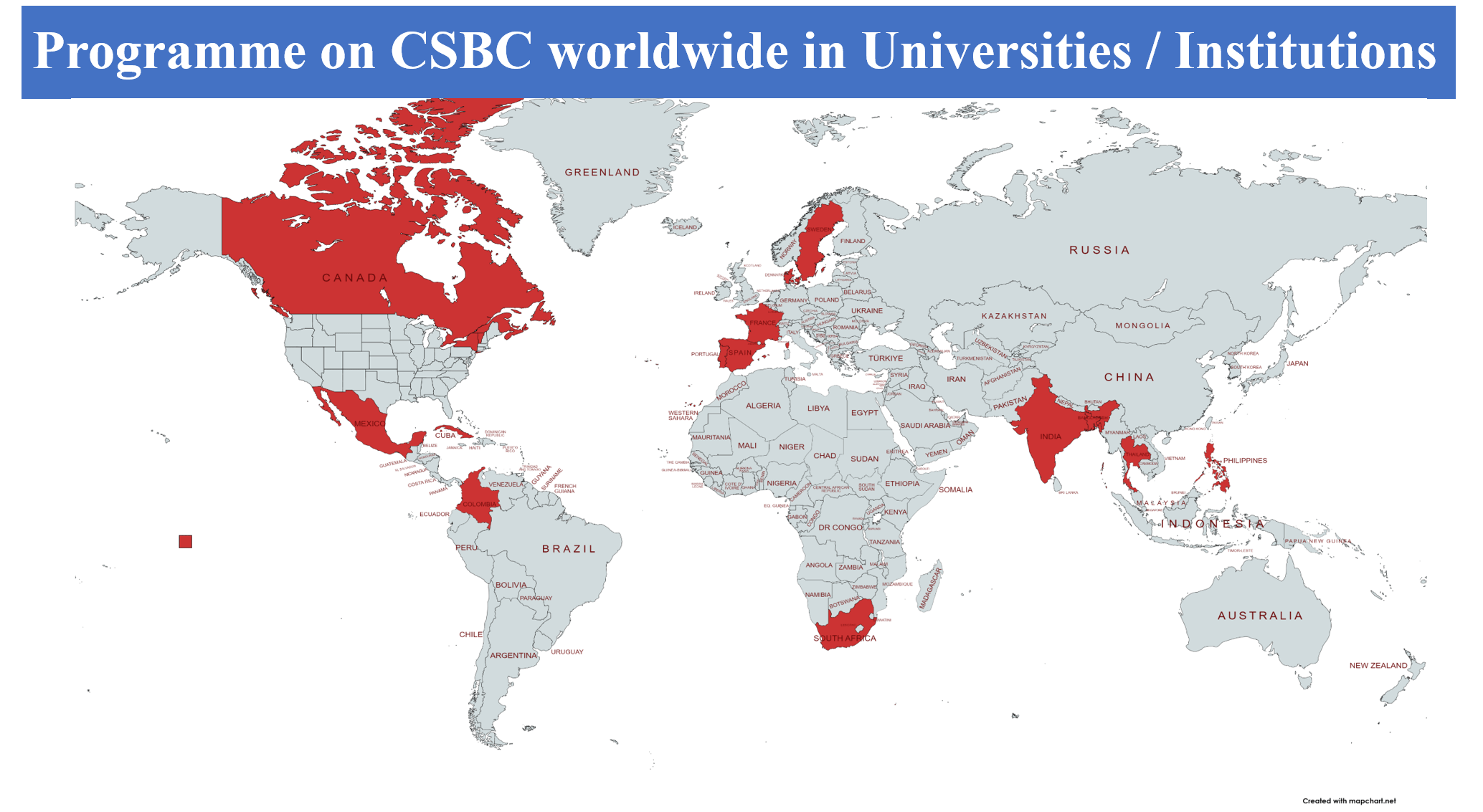
Indian higher educational institutions such as Gujarat University, University of Hyderabad Tezpur University, Lady Irwin College of University of Delhi, XISS Ranchi, and others has been offering course relating to communication for social and behaviour change either at the undergraduate and/or at master’s level programme under media/mass communication/ journalism and social work.
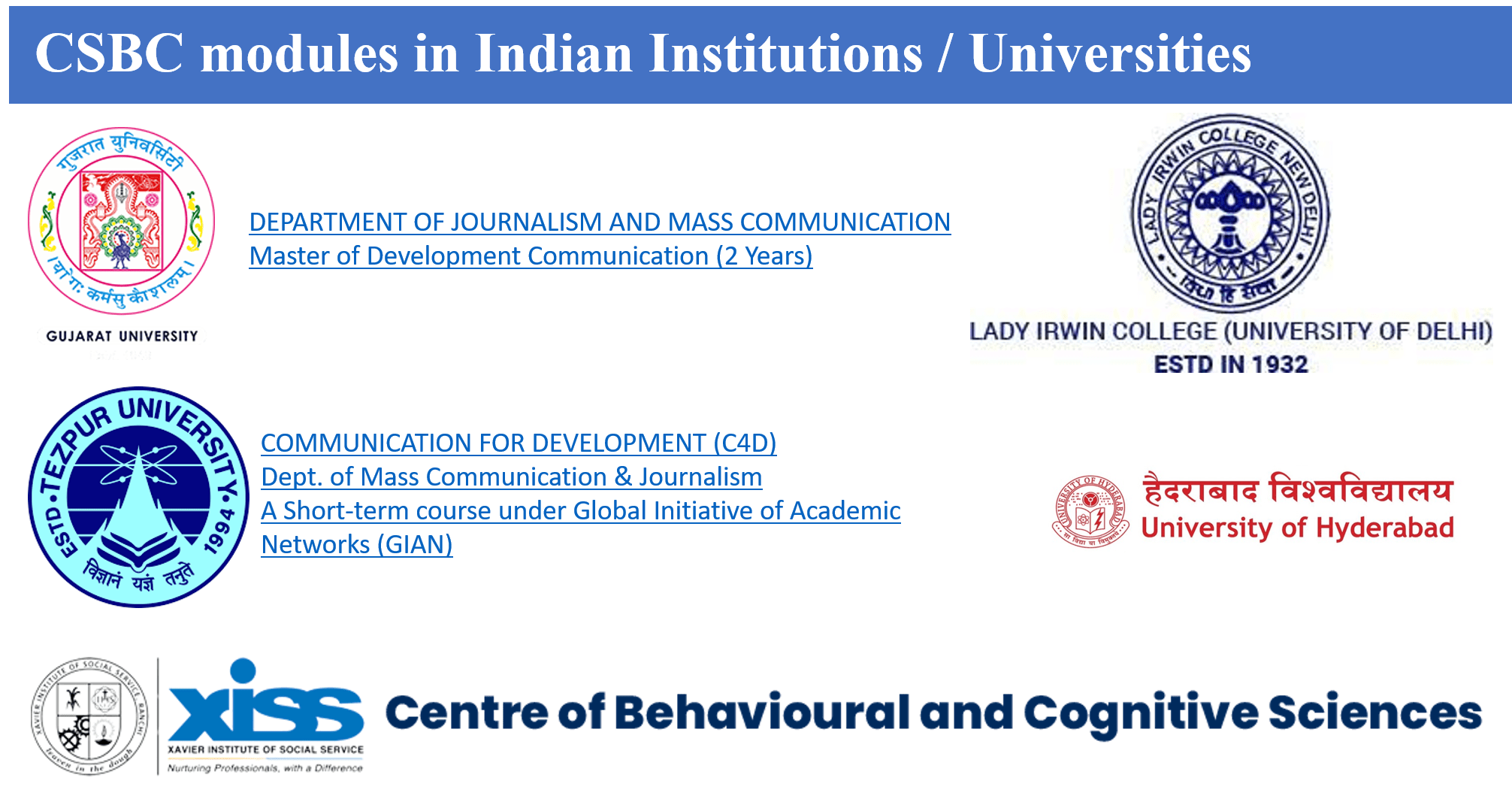
UNICEF’s nine modules comprising of sixty units of CSBC, aims to develop desirable social behaviour among the Indian youth through a balanced mix of theory and practice.
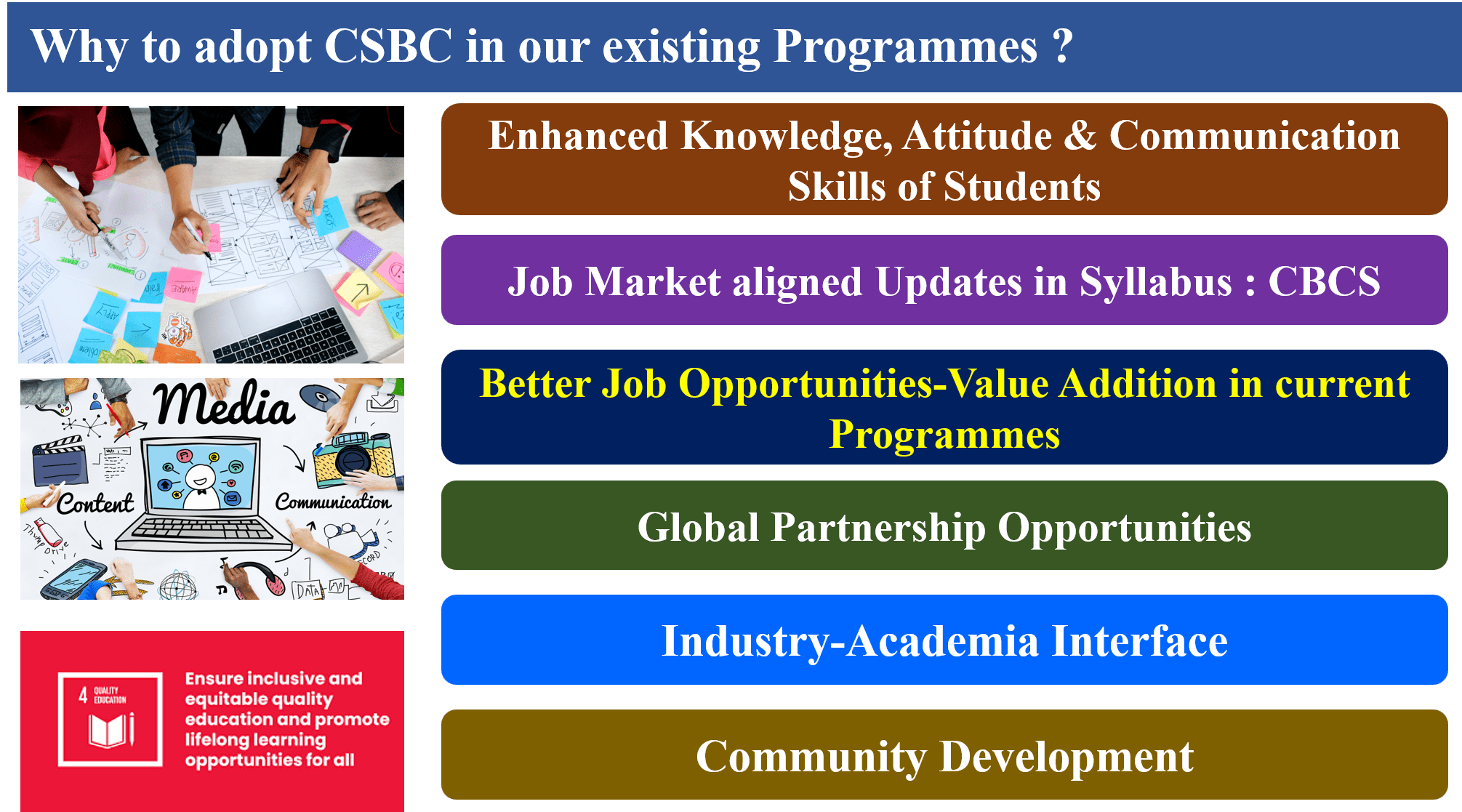
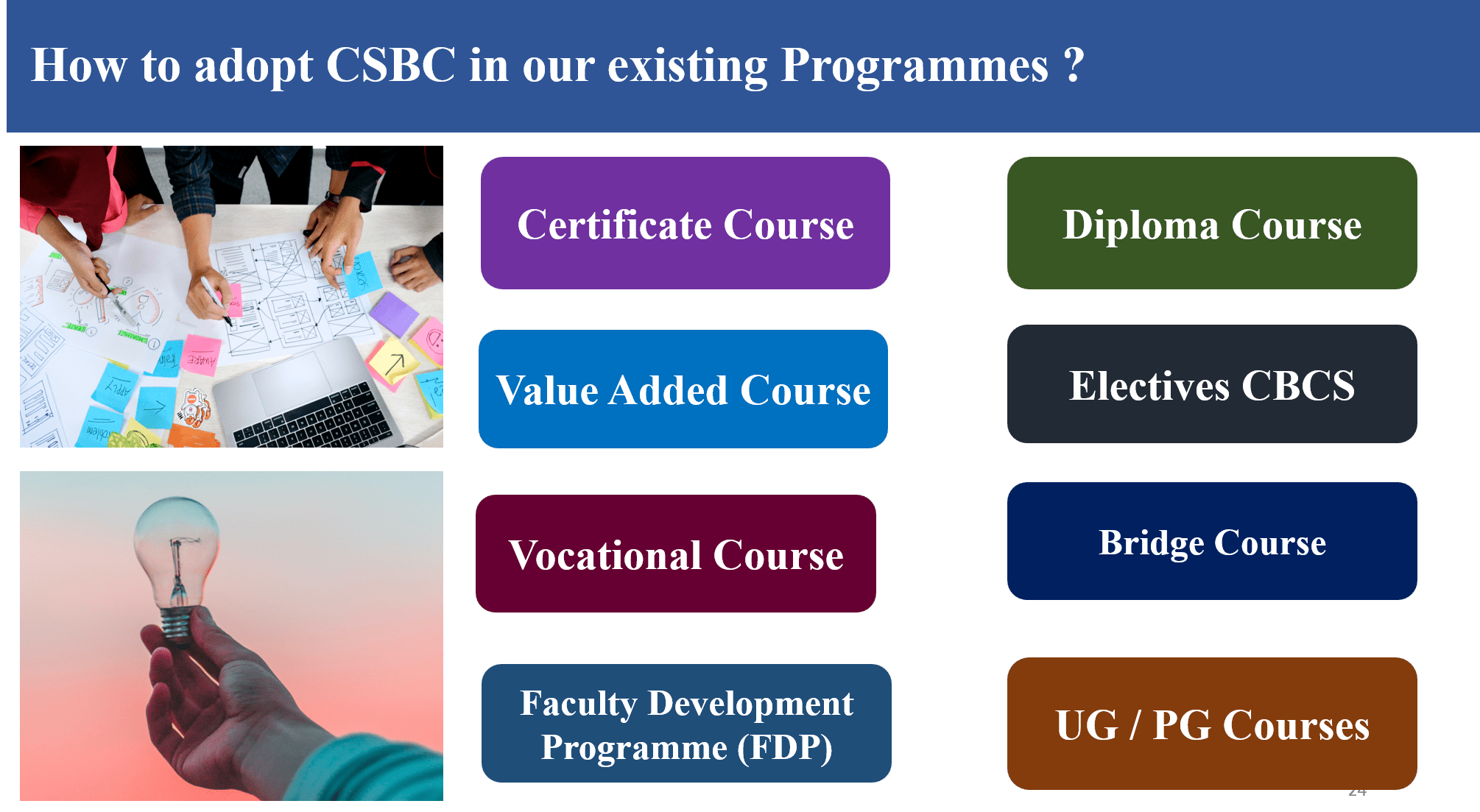
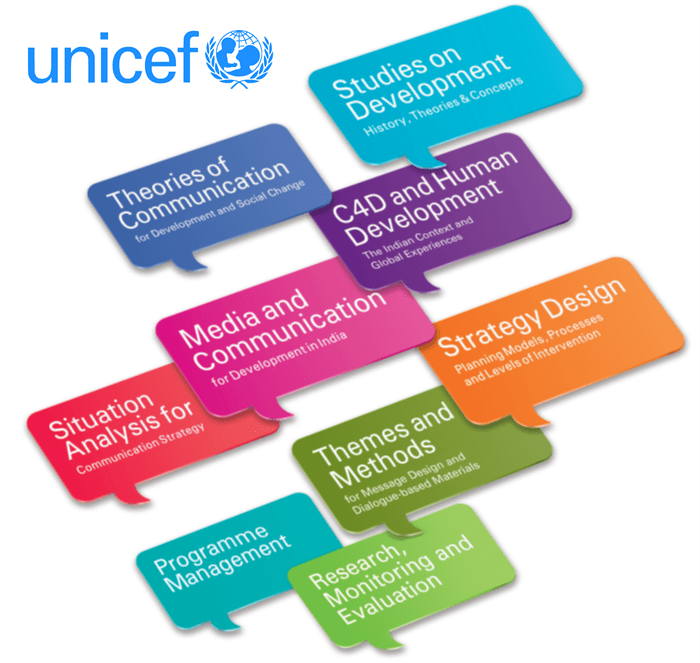
UNICEF’s nine modules comprising of sixty units of CSBC, aims to develop desirable social behaviour among the Indian youth through a balanced mix of theory and practice. Indian higher educational institutions may offer CSBC programme/ course to students as
| Certificate/diploma course | Faculty Development Programmes (FDPs) |
| Value Added Course | Bridge Course for social/development sector workers/professionals/ executives |
| Vocational Course | A subject/paper in under/post graduate courses |
| As an elective under Choice based credit system (CBCS) | Incorporating specific module/unit of CSBC in existing courses |
Unicef India’s advocacy for integration of CSBC in Indian higher educational courses/programmes are based on reasoning of developing desirable social behaviour traits/personalities among the youth through building required competencies for meeting up industry expectations in various areas of professional work.
The drivers and challenges in integrating CSBC in Indian Higher educational institutions may be as follows;
| Drivers | Challenges |
| Opportunities for interdisciplinary teaching-learning and research activities | Establishing specific department for ownership of the CSBC programme |
| Better human resource development aligned with industry requirements | Lack of competent and trained faculty members |
| Academic innovations and autonomy | Programme sustainability in long-run |
| Training and support centers for community development | May lead to low adoptability attitude among higher educational institutions and students |
| Helpful in promoting research evidence-based incubation centers | Hectic curriculum adoption /amendment approval procedure |
| Encouraging interdisciplinary approach of National Educational Policy 2020 | Educating stakeholders for adoption / integration in existing courses |
| Helpful in achieving Sustainable development goals (SDGs) through addressing socio-economic and environmental aspects | May overburden faculty and students in conducting fieldwork or practice |
Considering the above-mentioned aspects of the nine modules developed by the unicef India, policy level interventions may be considered to effectively integrate the course/programme on ‘Communication for Social and Behaviour Change’ for upcoming generation of learners, educators, and researchers as it may have multiplier effect on society and economy at large.
